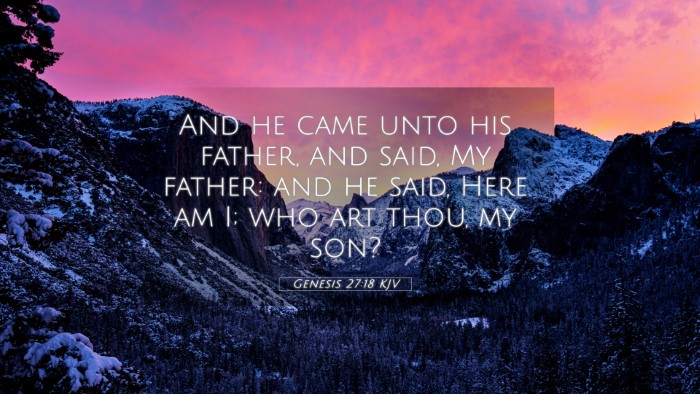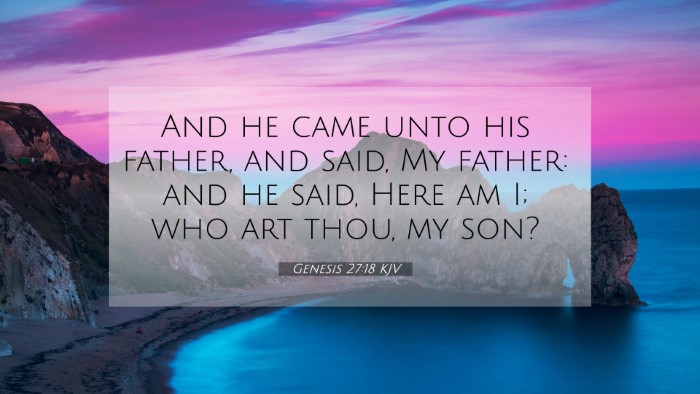Understanding Genesis 27:18
Genesis 27:18 states: "And he came unto his father, and said, My father: and he said, Here am I; who art thou, my son?" This verse captures a pivotal moment in the biblical narrative involving key characters like Jacob and Isaac. It highlights themes of deception, familial relationships, and divine purpose.
Verse Context and Analysis
In examining Genesis 27:18, we consider several aspects:
- Historical Context: This verse occurs during the incident of Jacob deceiving his father Isaac to receive the blessing intended for Esau.
- Character Dynamics: Jacob, having been encouraged by his mother Rebekah, approaches Isaac, which sets in motion a series of events with significant theological implications.
- Divine Providence: The narrative points to a greater divine plan, as despite the deception, God's earlier declaration that the older would serve the younger comes to pass.
Insights from Commentaries
Public domain commentaries provide rich insights into this verse:
- Matthew Henry: He emphasizes the complexity of human actions and divine sovereignty, noting how Jacob's personal failings did not thwart God's plans.
- Albert Barnes: His commentary focuses on the moral implications of deception within families and the ultimate consequences that unfold from this act of trickery.
- Adam Clarke: He comments on the significance of names and identities, highlighting how Jacob's actions frame his complex relationship with his brother Esau.
Bible Cross References
Genesis 27:18 resonates with several other scriptural passages, offering deeper insights into its themes:
- Romans 9:10-13: This passage reflects the divine choice of Jacob over Esau.
- Hebrews 12:16-17: References Esau's loss of his birthright, enhancing the theme of consequence for actions.
- Genesis 25:23: The prophecy regarding the struggle between Jacob and Esau.
- Genesis 27:1-5: Provides the full context of Isaac's intentions and Rebekah's plot.
- Matthew 1:2-3: Genealogy of Jesus, which includes both Jacob and Esau, showcasing the ongoing significance of these figures.
- Galatians 4:22-31: Allegorical interpretation of Isaac and Rebekah's sons symbolizing two covenants.
- Genesis 32:28: A later moment where Jacob's name change signifies his spiritual encounter, adding depth to his character.
- James 1:14-15: Discusses temptation and sin, akin to Jacob's actions fueled by deceit.
- Exodus 20:16: Addressing falsehood and deception, reinforcing the moral teachings relevant to this narrative.
- Proverbs 12:22: Affirms that God detests lying lips, adding a cautionary layer to the story.
Connections Between Bible Verses
Genesis 27:18 encourages readers to explore Bible verse cross-references for a comprehensive understanding of biblical themes.
Using tools for Bible cross-referencing, one can identify patterns and connections, enriching the study of scripture:
- Understanding Thematic Connections: Investigate how deception plays a role in the lives of key biblical characters.
- Comparative Bible Verse Analysis: Compare the deception in Genesis to Jesus' teachings on truth in the New Testament.
- Identifying Cross-References: Use a Bible concordance to track themes of blessing and deceit throughout scripture.
- Bible Reference Resources: Reference guides help clarify the moral and ethical lessons in this narrative.
- Linking Bible Scriptures: Draw parallels between Old Testament characters and their New Testament implications.
Thematic Bible Verse Connections
The verse invites deeper exploration into themes like:
- Family Dynamics: Relationships and conflicts within families.
- Divine Sovereignty: How God orchestrates events despite human shortcomings.
- Identity and Destiny: The significance of names and their implications on life choices.
Conclusion
In conclusion, Genesis 27:18 serves as a rich resource for understanding the interplay of deception, familial relationships, and divine purpose. By exploring cross-references and connecting themes, readers gain insight into the complexities of the biblical narrative. Engaging with public domain commentaries enhances this understanding, making Genesis 27:18 a valuable verse for both personal reflection and scholarly study.


